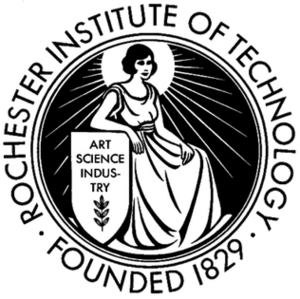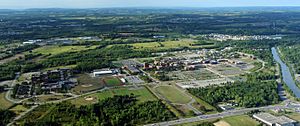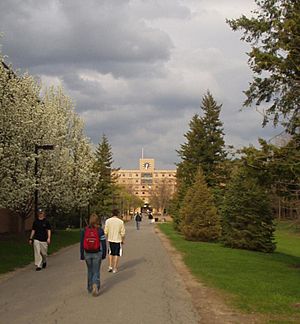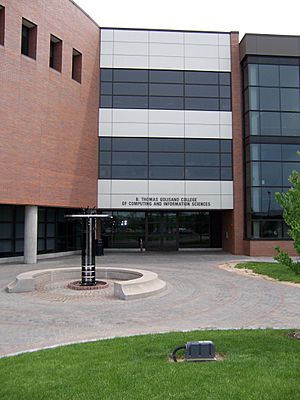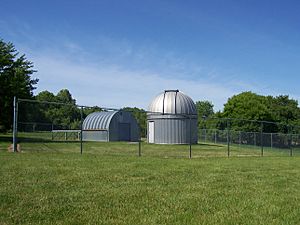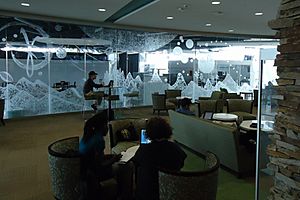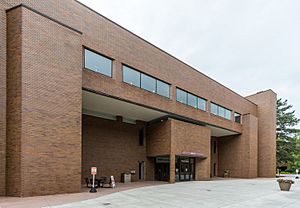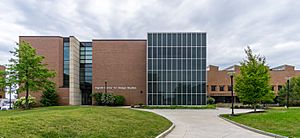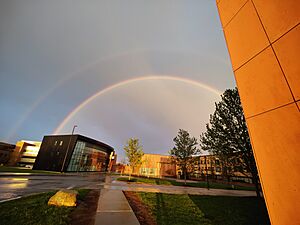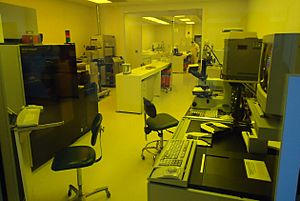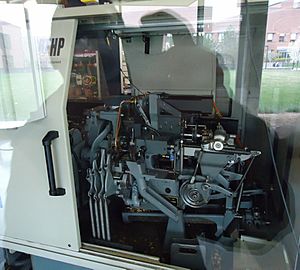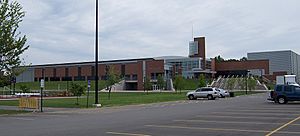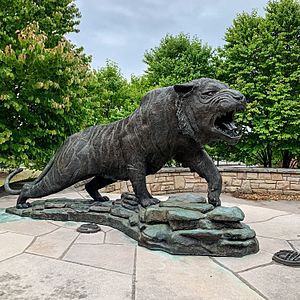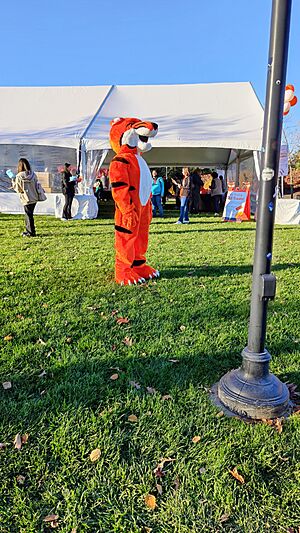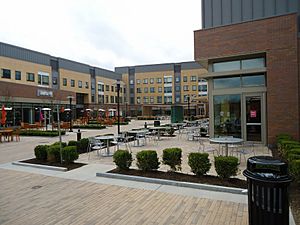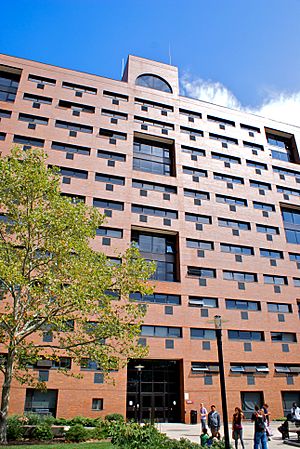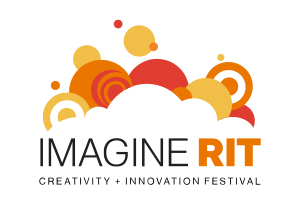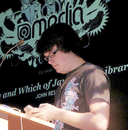Rochester Institute of Technology facts for kids
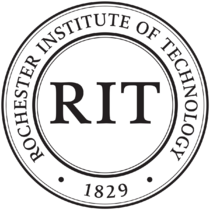 |
|
|
Former names
|
Rochester Athenæum (1829–1891) The Mechanics Institute (1885–1891) Rochester Athenæum and Mechanics Institute (1891–1944) |
|---|---|
| Type | Private research university |
| Established | 1829 |
|
Academic affiliation
|
|
| Endowment | $1.384 billion (FY24) |
| President | William H. Sanders |
| Provost | Prabu David |
|
Academic staff
|
1,547 (Full-time, part-time, adjunct) |
|
Administrative staff
|
2,642 |
| Students | 20,570 |
| Undergraduates | 17,528 |
| Postgraduates | 3,042 |
| Location |
,
,
United States
43°05′05″N 77°40′34″W / 43.08472°N 77.67611°W |
| Campus | Suburban 1,300 acres (5.3 km2) |
| Colors | Orange and Brown |
| Nickname | Tigers |
|
Sporting affiliations
|
NCAA |
| Mascot | RITchie the Tiger |
 |
|
The Rochester Institute of Technology (RIT) is a private research university located in Henrietta, New York. This town is a suburb of Rochester. RIT was started in 1829. It is one of only two special technology institutes in New York.
RIT has about 19,000 students. Around 16,000 are undergraduate students and 3,000 are graduate students. These students come from all over the United States and more than 100 other countries. The university also has over 4,000 teachers and staff members. RIT has campuses in other countries like Croatia, Kosovo, Albania, and the United Arab Emirates.
Contents
History of RIT
How RIT Started
RIT began in 1891 when two schools joined together. One was the Rochester Athenæum, a literary society started in 1829. The other was The Mechanics Institute, a school for practical technical training founded in 1885. When they merged, the new school was called Rochester Athenæum and Mechanics Institute (RAMI).
The Mechanics Institute was seen as the main school that continued. It took over the Athenæum's original founding date of 1829. In 1944, the school changed its name to Rochester Institute of Technology. It became a full research university at that time.
Moving to a New Campus
RIT was first located in the city of Rochester. By the mid-1900s, the university needed more space. Also, a new highway was planned to go right through the campus.
In 1961, a generous gift of $3.27 million from Grace Watson helped the university. This money allowed RIT to buy land for a new campus. The new campus is about 1,300 acres and is located in Henrietta, New York. The university moved to this new suburban campus in 1968, where it is today.
Important Programs and Changes
In 1966, the United States government chose RIT to be the home of the new National Technical Institute for the Deaf (NTID). NTID welcomed its first students in 1968, the same year RIT moved to Henrietta.
RIT has also been a leader in creating new study programs. In 1982, it started the microelectronic engineering program. This was the first undergraduate program in the country focused on making computer chips. In 1990, RIT began its first PhD program in imaging science. This was also the first of its kind in the U.S. RIT was also one of the first to offer degrees in Information Technology (1993) and Software Engineering (1996).
RIT Campus Life
The "Brick City" Campus
The main RIT campus covers 1,300 acres. Much of this land has woodlands and swamps, which are home to many different plants. The campus has 237 buildings. These buildings are mostly made of bricks. Students even call RIT "Brick City" because of this! Events like the annual "Brick City Homecoming" are named after it.
The campus is also known for being environmentally friendly. In 2009, it was named a "Campus Sustainability Leader."
Walking Around Campus
A path called the "Quarter Mile" connects the student dorms to the academic buildings. Along this path, you'll find various administration and support buildings. On the academic side, there's a courtyard called the Infinity Quad. It has a cool sculpture that looks like a twisted ribbon. On the dorm side, there's a sundial and a clock.
Near the Administration Building, you can see "The Sentinel." This is a huge steel sculpture created by artist Albert Paley. It stands 70 feet tall and weighs 110 tons. It's the largest sculpture on any American university campus.
RIT also has four apartment complexes for students: Global Village, Perkins Green, Riverknoll, and University Commons.
Gordon Field House
The Gordon Field House is a large, two-story sports center. It opened in 2004 and is named after Lucius "Bob" Gordon and his wife Marie. This building hosts many events, like concerts, job fairs, sports games, and graduations. Other facilities near the Quarter Mile include the Student Alumni Union and the Frank Ritter Memorial Ice Arena.
Art on Campus
RIT has a large art collection with thousands of pieces. Many of these are by RIT teachers, students, and graduates. The university buys new art from students each year.
You can see many of these artworks displayed around campus, including:
- Sentinel – a tall sculpture by Albert Paley near the Administration Circle.
- Growth and Youth – two murals by Josef Albers in the George Eastman Building.
- Principia – a mural by Larry Kirkland etched into the floor of the College of Science.
- Three Piece Reclining Figure No. 1 – a bronze sculpture by Henry Moore in Eastman Kodak Quad.
- Grand Hieroglyph – a large tapestry by Sheila Hicks in the George Eastman Building.
- Sundial – a sculpture by Alistair Bevington in the Residence Quad.
- The Monument to Ephemeral Facts – a mixed media sculpture by Douglas Holleley in Wallace Library.
- Unity – a 24-foot-tall stainless steel sculpture between three colleges.
How RIT is Organized
Leadership
As of July 2025, the president of RIT is William H. Sanders. He is the university's eleventh president. The provost, who is like the chief academic officer, is Prabu David.
Colleges at RIT
RIT has nine main colleges where students can study different subjects:
- College of Art and Design
- Saunders College of Business (for business)
- Golisano College of Computing and Information Sciences (for computers and information)
- Kate Gleason College of Engineering (for engineering)
- College of Engineering Technology
- College of Health Sciences and Technology
- College of Liberal Arts
- National Technical Institute for the Deaf (NTID)
- College of Science
There are also two smaller academic groups:
- Golisano Institute for Sustainability
- School of Individualized Study
RIT Around the World
RIT also has campuses in other countries:
- RIT Croatia in Dubrovnik and Zagreb, Croatia
- RIT Kosovo in Pristina, Kosovo
- RIT Tirana in Tirana, Albania
- RIT Dubai in Dubai, United Arab Emirates
Academics at RIT
RIT offers more than 200 different study programs. These include seven doctoral programs, which are the highest degrees you can get. In 2008–2009, RIT gave out many degrees, including bachelor's, master's, and doctorates.
RIT is part of the Rochester Area College group. This means RIT students can take classes at other colleges in the Rochester area without paying extra tuition. RIT used to have a "quarter system" for classes, but in August 2013, it switched to a "semester system."
Co-op Program
RIT has a special "co-op program" that started in 1912. It's one of the oldest and largest in the country. About 3,500 students each year work in real jobs at over 2,000 businesses. This program lets students work in their field for several months, taking a break from classes. Students don't pay tuition during their co-op and are still considered full-time students.
Library and Special Collections
The main library at RIT is the Wallace Library. It has many books and resources. The Cary Graphic Arts Collection has old books, printing tools, and other items about the history of printing. The RIT Archives keep records of the university's history. There's also the RIT/NTID Deaf Studies Archive, which collects items about the history and culture of the Deaf community.
Vignelli Center for Design Studies
The Vignelli Center for Design Studies opened in 2010. It holds the works of famous Italian designers Massimo and Lella Vignelli. This center is a place for learning and research about design.
ESL Global Cybersecurity Institute
The Global Cybersecurity Institute was started in 2020. It helps students learn about keeping computer systems safe from attacks. A large gift from RIT graduate Austin McChord helped fund this institute. In 2022, ESL Federal Credit Union also gave a big gift to the institute.
Research at RIT
RIT teachers receive many grants for their research. In 2022, they received $92 million for research projects. The university offers twelve PhD programs, including ones in imaging science, microsystems engineering, and computer science.
In 1986, RIT started the Chester F. Carlson Center for Imaging Science. This center does research in areas like digital image restoration, remote sensing, and color science. RIT was also one of the first universities to offer bachelor's programs in Information Technology (1991) and Software Engineering (1996).
RIT works with many companies and organizations on research. These include IBM, Xerox, NASA, and DARPA. In 2017, the U.S. Department of Energy chose RIT to lead a new institute. This institute, called REMADE, focuses on creating clean energy technologies.
RIT Athletics
RIT's sports teams are called the "Tigers." Most of RIT's teams play in NCAA Division III. However, the men's and women's ice hockey teams play at the Division I level. They are part of the Atlantic Hockey America conference.
In 2010, the men's ice hockey team made history by reaching the NCAA tournament semi-finals, known as the "Frozen Four." In 2012, the RIT women's ice hockey team won the NCAA Division III national championship. After that, the women's team also moved up to Division I.
The RIT men's lacrosse team has won two NCAA Division III national championships. They won in 2021 and again in 2022.
Tom Coughlin, a famous coach for the NFL's New York Giants, used to coach the RIT Men's Varsity Football team in the 1970s. This was his first head coaching job.
Since 1968, RIT's hockey teams played at the Frank Ritter Memorial Ice Arena. In 2010, RIT started raising money for a new arena. In 2011, B. Thomas Golisano and the Polisseni Foundation donated money for the new arena, which is now called the Gene Polisseni Center.
RIT Mascots
The "Tigers" nickname for RIT athletics came about after the men's basketball team had a perfect season in 1955–56. Before that, the teams were called the "Techmen."
In 1963, RIT students raised money to buy a rescued Bengal tiger cub. They named him SpiRIT, which stood for Student Pride in RIT. Students were trained to care for the cub and took him to most sports events. Sadly, the cub became ill and passed away. The original tiger's fur is now kept in the RIT Archive Collections. A bronze statue of a tiger now stands in the center of the Henrietta campus.
Later, a costumed tiger mascot named RITchie was introduced. RITchie appears at many campus events. Students chose his name in a contest in 1989.
Student Life at RIT
RIT has over 150 student clubs and 10 major student organizations. There are also about 30 different Greek organizations (fraternities and sororities).
Reporter magazine is a student-run magazine that has been around since 1951. RIT also has its own ambulance service, a TV sports program called RIT SportsZone, a pep band, a radio station, and a tech crew.
The Gordon Field House and Activities Center is a place for sports, swimming, and fitness. It also has an auditorium for concerts and other shows. Famous performers like Kanye West and Bob Dylan have played there.
Deaf and Hard-of-Hearing Students
One special thing about RIT is that many students are deaf or hard-of-hearing. They make up about 8.8% of all students. The National Technical Institute for the Deaf (NTID) is one of RIT's colleges. NTID provides sign language interpreters and real-time captioning for classes and events. This helps deaf and hard-of-hearing students understand lectures. Some professors are also deaf or hard-of-hearing, and interpreters help hearing students understand them. This large group of students makes RIT a very diverse and welcoming place.
Fraternities and Sororities
RIT has thirty fraternities and sororities (social clubs for students). These groups make up about 6.5% of the student population. There are special buildings on campus for some of these Greek organizations.
Special Interest Houses
RIT's dorms have "Special Interest Houses." These are places where students who share a hobby or interest can live together. Examples include Computer Science House, Engineering House, and House of the Arts. Students in these houses share their interests through special activities and academic focus.
ROTC Programs
RIT hosts the Air Force ROTC and Army ROTC programs. These programs help students train to become officers in the U.S. military. RIT students can also join the Naval ROTC program at the University of Rochester.
Reporter Magazine
Reporter magazine is completely run by students. It's a full-color magazine that comes out once a month during the school year. It also has regular content online. Reporter started as a newspaper in 1951 and became a magazine in 1969.
K2GXT – RIT Amateur Radio Club
Students interested in amateur radio can join the K2GXT club. It's the oldest club on campus, started in 1952. The club has a radio system that serves the campus and nearby areas.
WITR 89.7
WITR 89.7 is an FM radio station run by RIT students. It plays different types of music, broadcasts RIT sports events, and has talk radio shows.
College Activities Board (CAB)
The College Activities Board, or CAB, is a student group that plans fun events for students. They organize concerts, trips, movie screenings, and other activities to make student life better at RIT.
Imagine RIT Festival
"Imagine RIT" is an annual festival that started in May 2008. It's a chance for RIT to show off all the cool and creative things happening at the university. Visitors can see new ideas for products, admire art, explore student research, and enjoy performances. It's a fun event for all ages, including children. Over 35,000 people attended the festival in 2018.
Rochester Game Festival
The Rochester Game Festival is an annual event that shows off video games and tabletop games. These games are made by RIT students and independent game developers in the area. More than 1,300 people attended the festival in 2019.
RIT Ambulance
RIT Ambulance (RITA) is a student-run service that provides emergency medical help on campus. It is a certified ambulance agency in New York State.
Public Safety
RIT Public Safety is in charge of keeping students, staff, and property safe. They also make sure college rules and state laws are followed. Public Safety officers patrol the campus and manage a call box system for emergencies.
Dining Services
RIT Dining Services runs many restaurants and food shops on campus. There are cafeterias and small food places near the dorms, in the Student Alumni Union, and in academic buildings. RIT Dining Services also offers jobs for international students. Since early 2019, the campus has even grown some of its own food, like lettuce and kale, in a hydroponic farm.
How RIT is Governed
RIT uses a "shared governance" system. This means that students, staff, and teachers all have a say in how the university is run. The Student Government, Staff Council, and Academic Senate work together. The University Council brings representatives from all three groups to make suggestions to the university president. The president then makes the final decision.
Student Government
The Student Government is made up of elected student senators and a cabinet chosen by the student president and vice president. They speak up for students and work to improve campus life.
Academic Senate
The Academic Senate represents the teachers and faculty in the shared governance system. It has 43 senators.
Staff Council
The Staff Council represents the staff members in the shared governance system.
Famous People from RIT
RIT has over 125,000 graduates around the world. Eleven RIT alumni, people connected to RIT, and teachers have won the Pulitzer Prize.
Some notable alumni include:
- Fredericka Douglass Sprague Perry, a kind person who helped Black children. She was the granddaughter of Frederick Douglass.
- Bob Duffy, who used to be the Lieutenant Governor of New York.
- Tom Curley, former president and CEO of the Associated Press.
- Daniel Carp, former chairman of the Eastman Kodak Company.
- John Resig, a software developer who created jQuery.
- Austin McChord, who founded and was CEO of Datto.
- Fiona Ma, who is the California State Treasurer.
-
Katherine Hayles; James B. Duke Distinguished Professor Emerita of Literature at Duke University. (BS 1966)
-
John Resig; Dean of computer science at Khan Academy. (BS 2005)
-
Robert J. Duffy; Lieutenant governor of New York from 2011 to 2014 and the 65th mayor of Rochester, New York, from 2006 to 2010. (BS 1993)
-
Steven Van Slyke; Invented organic light-emitting diode. (MS)
RIT Presidents and Provosts
Before RIT had its first president, the university was mainly managed by its board of trustees.
|
|
See also
 In Spanish: Instituto de Tecnología de Rochester para niños
In Spanish: Instituto de Tecnología de Rochester para niños
- Association of Independent Technological Universities
- List of Rochester Institute of Technology alumni
- RIT Tigers


